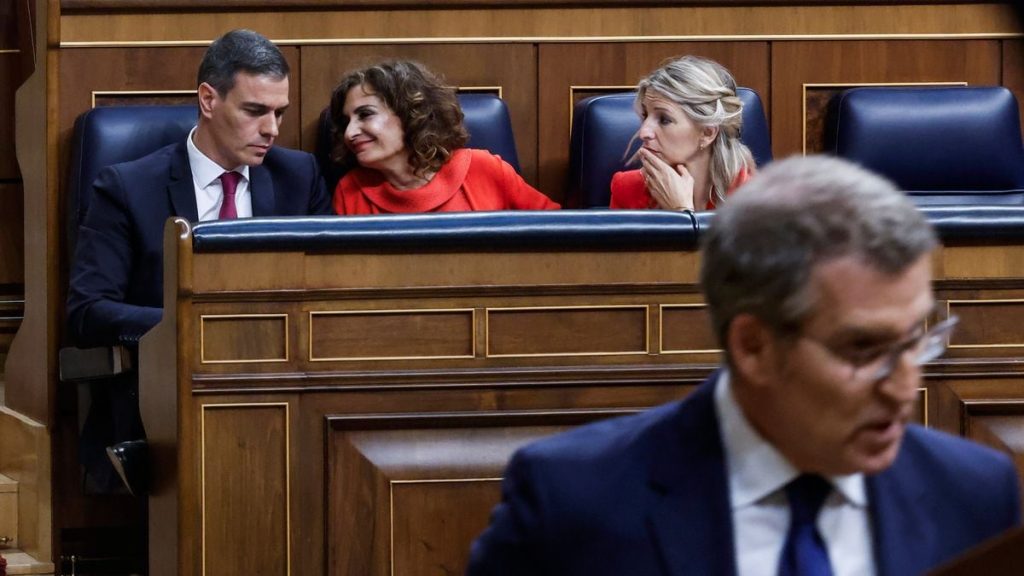Pedro Sánchez arrived early on Wednesday at the Congress determined to rise above the political turmoil that had engulfed the parliamentary debate in recent weeks. The president was facing one of his periodic and obligatory appearances to report on the agreements reached at the latest European Council meeting, a gathering that usually leads to discussions on everything except the reason for the convocation. However, this time Sánchez was determined to showcase international leadership and not fall back into the frenetic cycle of accusations with the PP. Despite facing resistance, particularly from Alberto Núñez Feijóo who tried to steer the debate towards more favorable ground, Sánchez ultimately succeeded. The word “Koldo” was not heard once, and the discussion of amnesty was only a distant echo in a debate that focused on topics such as Ukraine, Gaza, and even the Sahel, a true anomaly by the standards of this Congress.
Sánchez began the session with a shorter-than-usual speech of about 36 minutes, focusing on two main points. Firstly, his willingness to recognize the Palestinian state as a response to “one of the most deplorable humanitarian disasters of this century” caused by Israel’s “absolutely disproportionate” response to terrorism by Hamas. Secondly, the need to increase defense spending in response to the “growing bellicosity” of Vladimir Putin’s Russia, not to start “a new arms race”, as he quickly clarified, but to ensure that Europe is “respected”. Most speakers adhered to the script and presented their positions on the issues raised by the president, with those on the left – including government partners from Sumar – distancing themselves from the call to increase military arsenals.
Feijóo navigated between two positions during the debate. While he initially joked about Sánchez talking so much about peace that he seemed like the “reincarnation of Gandhi”, he quickly shifted to discussing agreements with EH Bildu, Puigdemont, and “corruption in his personal circle”. Feijóo accused Sánchez of trying to distract from national issues by focusing on international matters, prompting a stern response from the president who highlighted the current war and jihadist threats in Europe, which the PP leader never addresses. Sánchez even advised Feijóo to “study” to gain more knowledge of international politics, repeatedly contrasting Spain’s international prominence and economic success with Feijóo’s perceived lack of substance.
Fueled by Sánchez, Feijóo avoided discussing national politics in his response and instead focused on more comfortable foreign territories such as Venezuela and Morocco. While he initially mentioned that recognition of Palestine should follow a consensus, he later added further conditions such as a ceasefire in Gaza and the release of Israeli hostages by Hamas. Despite pressure from a variety of left-wing speakers, Feijóo did not condemn the killings of Palestinians. All government allies supported the recognition of the Palestinian state, with some calling for a break in diplomatic relations with Israel, criticizing international inaction, and expressing frustration at the lack of progress. The left also united against increased defense spending, advocating for diplomatic efforts in Ukraine rather than a militaristic escalation in Europe.
The debate underscored the growing dissatisfaction of the government’s minority partner, Sumar. Errejón bluntly stated that the PSOE has chosen to intensify competition with Sumar, a “legitimate but deeply misguided” strategy. He warned that unity is essential for survival in politics and criticized the government’s actions since the last election, emphasizing the need for cooperation among leftist parties. Sánchez merely acknowledged the criticism, stating that it is good for the left to express dissatisfaction while also appreciating their efforts. His repeated refrain throughout the debate was “The mud and nothingness, Mr. Feijóo. The mud and nothingness.” Overall, the session highlighted the complexities and tensions within the Spanish political landscape during a time of international and domestic challenges.















